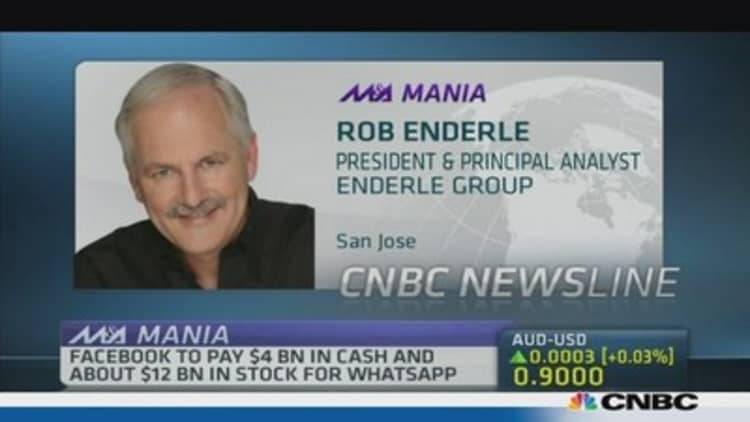
Facebook's staggering $16 billion acquisition of WhatsApp is a sign of sheer "desperation," according to one industry watcher, who argues that the social networking giant has overpaid for the mobile-messaging start-up.
"This is crazy money. I think they massively overpaid for this. They've done it because they are desperate," Rob Enderle, principal analyst at Enderle Group, told CNBC on Thursday.
"They are so worried that they are bleeding users that they are trying to get their user count up by buying companies that have users. But that reminds me so much of some of the strategies of the dotcom era, it's actually giving me chills," he said.
(Read more: An outrageous price for WhatsApp? Hang on ...)
Facebook's purchase of WhatsApp is the company's largest acquisition yet—dwarfing the $1 billion it paid for Instagram—highlighting its ambition to get a piece of the fast-growing mobile messaging market.
Facebook CEO Mark Zuckerberg has been trying to get into the mobile messaging market for some time, offering to buy photo-sharing mobile app Snapchat for $3 billion last year. However, the offer was rejected.
(Read more: Snapchat turns down $3 billion cash offer from Facebook)
While the popular instant messaging platform has 450 million monthly active users worldwide—with 70 percent active on a daily basis—it has taken a cautious approach to monetizing its service, charging an annual subscription fee of $1 after a year of free use.
Investors appeared unimpressed with the deal, sending Facebook shares down 3.7 percent in premarket trading. (Click here for the latest price.)
"This showcases the market is thinking this is not good management practice. Investors don't get excited about companies that aren't using good judgment," Enderle said.
"They are losing user attention, and they are trying to buy them back by buying applications. You don't necessarily do it by acquiring because by so doing, you're only buying the users as they exist in that particular instant. You get users by creating capability in the site that you have," he added.
(Read more: Facebook's promise of growth: A portfolio of apps)
Robert Pavlik, chief market strategist at Banyan Partners, disagreed the acquisition was a desperate move.
"They are trying to find that messaging company that will take them forward. Zuckerberg believes this is the future for mobile. I do think there's a real potential for them to succeed," Pavlik said.
"You are probably going to see people question the deal, and put pressure on Facebook shares, but the fact of the matter is Facebook is really trying and succeeding in some regard to monetizing their business. This is another step in that direction," he said.
David Williams, CEO of Williams Capital Advisors, sees the deal as defensive.
The company was likely willing to pay the high price to prevent a competitor from acquiring the platform before it begins to really monetize its own users, said Williams. "It's a high price, but they had to do it, or someone else would have," he added.
However, he acknowledges that the deal will weigh on the company's earnings in the near-term. "You've got more shares outstanding, and you also used up cash. It's going to hurt," he said.
Only time will tell
Like most large acquisitions, the final verdict on this transaction will be determined in the future and depend on strategy and execution over time, Citi analyst Mark May wrote in a note.
"On the surface, Facebook is acquiring the global mobile messaging leader (#1 in most, though not all, countries), which is a valuable asset in terms of monetization opportunity," May said.
"However, while we respect WhatsApp's position of focusing in the near term on user growth and engagement and not monetization, the experience of other similar messaging apps like WeChat, Kakaotalk and LINE suggest significant revenue opportunities in areas like games, stamps/stickers and payments/m-commerce," he added.
If WhatsApp were able to monetize at a similar rate to some of these apps, it would imply $1.5-2 billion in revenue, according to Citi, based on the current size of its user base.
—By CNBC's Ansuya Harjani. Follow her on Twitter @Ansuya_H.


